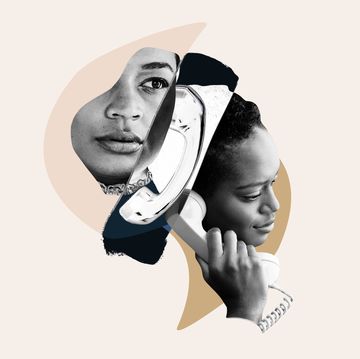A woman who received a brain implant to help treat her depression has opened up about how her life has been impacted one year on.
Sarah, who lives in the US, was the first person in the world to receive the experimental treatment just over a year ago. The electrical implant, which sits inside her skull and is wired to her brain, can detect and treat severe depression by delivering an impulse when it senses that Sarah needs it.
Dr Katherine Scangos, who is a psychiatrist at the University of California where the study is being carried out, said the implant works by locating the 'depression circuits' in Sarah's brain.
'We found one location, which is an area called the ventral striatum, where stimulation consistently eliminated her feelings of depression,' Dr Scangos points out, 'And we also found a brain activity area in the amygdala that could predict when her symptoms were most severe.'
Sarah joined the study after experiencing prolonged bouts of severe depression despite frequent courses of anti-depressants and trying electroconvulsive therapy. Speaking about her decision have the implant, the 36-year-old told the BBC she had 'exhausted all possible treatment options', and that her 'daily life had become so restricted'.
'I felt tortured each day, I barely moved or did anything,' she added, 'When I was in the depths of depression all I saw is what was ugly.'
Despite the nature of the surgery, Sarah pointed out that the potential for 'any kind of relief' was better than the depression she'd been experiencing in recent years. The surgery, which took an entire day and was carried out under general anaesthetic, involved drilling holes into Sarah's skull to fit the wires that stimulate her brain. Then, the battery and pulse generator were tucked into the bone beneath her scalp and hair.
After the surgery, Sarah revealed she instantly felt an improvement in her mood. 'When the implant was first turned on, my life took an immediate upward turn. My life was pleasant again,' she said, 'Within a few weeks, the suicidal thoughts disappeared.'
Now, over a year after receiving the implant, Sarah has praised how the treatment has impacted her life, with no side-effects whatsoever. 'The device has kept my depression at bay, allowing me to return to my best self and rebuild a life worth living,' she said.
Speaking about whether or not she can feel the device when it's working, she explained: 'I could probably tell you within 15 minutes that it has gone off because of a sense of alertness and energy or the positivity I will feel.'
Details of the study were published in the Nature Medicine Journal, and although researchers from the University of California emphasise that it's currently too soon to say whether the treatment may help other patients or other conditions, the results have been promising.
Dr Scangos has already recruited two more participants for the study, but highlights that before it's rolled out to the public, scientists 'need to look at how these circuits vary across patients and repeat this work multiple times'.
If you're struggling with your mental health and need some support, find more information at Mind. Alternatively, call the Samaritans helpline 24/7 for free, on 116 123.
Jade Biggs (she/her) is Cosmopolitan UK's Features Writer, covering everything from breaking news and latest royal gossip, to the health and fitness trends taking over your TikTok feed. She also works on first-person features and investigative long-reads, taking a deep-dive into mental health, celebrity culture and women's rights. Jade has been a journalist and content writer for ten years, and has interviewed leading researchers and doctors, high-profile influencers and fitness experts. She is a cat mum to four fur babies and is obsessed with Drag Race, bottomless brunches and wearing clothes only suitable for Bratz dolls. Follow her on Instagram or Twitter.














